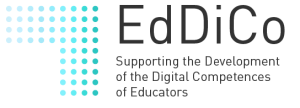JISC: Digital Wellbeing for you, your colleagues and students
Explore and understand your role as educator ensuring digital wellbeing, preventing negative impacts of technology on you, your colleagues, and students’ wellbeing.
Explore and understand your role as educator ensuring digital wellbeing, preventing negative impacts of technology on you, your colleagues, and students’ wellbeing.
Explore the importance and challenges of defining new future skills
This OER focus on developing competences related to
Introduction to Digital Wellbeing
Self-Image, Online and Offline Identities
Digital Footprint, Netiquette and Reputation
Cyber Bullying and Conflict Resolution
Privacy, Security and Safety
Personal Goals and Managing Distraction
Critical Thinking, Fake News and Extreme Views
Digital Citizenship and Social Responsibility
This OER focus on developing competences related to
Introduction to Digital Wellbeing
Self-Image, Online and Offline Identities
Digital Footprint, Netiquette and Reputation
Cyber Bullying and Conflict Resolution
Privacy, Security and Safety
Personal Goals and Managing Distraction
Critical Thinking, Fake News and Extreme Views
Digital Citizenship and Social Responsibility
The quantity and forms of data available globally is increasing exponentially and global development is amongst the areas seeking to harness its potential. Human capacity and judgement is critical at all stages of data work. This course has been designed to help learners develop their data skills in order to make a difference in global society and is open to anyone with an interest in learning about how data and data skills can contribute to global development. It is likely to be of particular interest to early career global development professionals/job seekers and higher education students studying social science related disciplines.
This report shows the work done for the O4.1 Digital Skills E-Assessment Tool. It covers work from May 2019 to August 2021 on e-validation of digital skills for the DigiCulture MOOC (Massive Open Online Courses). During this period, the DigiCulture project has designed the e-assessment tool, performed user testing with cultural stakeholders and produced content for the e-assessment tool. The e-assessment tool was then developed and integrated into the DigiCulture VLH platform.
The e-assessment tool aimed to work as an assessment method, which could automate assessment of whether learners had achieved new competencies and knowledge, to the extent possible within an automated paradigm. It was developed as a Quiz module in Moodle and guidelines were created to make sure questions from all partners adhered to the type of exam needed. Upon completion of the exam the e-assessment tool provided a certificate if users passed. The certificates were translated into all 7 languages for all 13 courses.
The technologies and channels, including digital, to enhance learning.
Use different channels of perception, learning styles, strategies and methods to acquire knowledge, know-how, skills and competences.
The strategies and didactical methods of learning in which the main elements include the use of ICT technologies.
Create and edit digital content in different formats, express oneself through digital means.
Supporting the Development and Certification of the Digital Competences of Educators – EdDiCo
Project Ref: 2019-1-DE01-KA203-005070
This project has been funded with support from the European Commission. This website reflects the views only of the authors, and the Commission cannot be held responsible for any use which may be made of the information contained therein.

